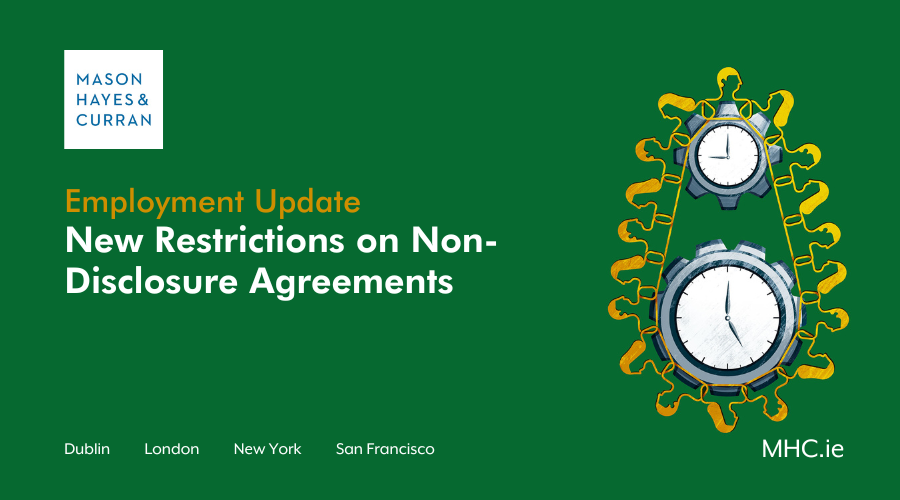New Restrictions on Non-Disclosure Agreements

Our Employment Law & Benefits team examines how new legislation restricts the use of non-disclosure agreements in an employment context where there are allegations of discrimination, victimisation, harassment and sexual harassment.
The Maternity Protection, Employment Equality and Preservation of Certain Records Act 2024 (the Act) was recently signed into law. The Act amends the Employment Equality Act 1998 by restricting the use of non-disclosure agreements (NDA). This restriction applies in situations involving allegations of discrimination, victimisation, harassment and sexual harassment. These NDAs will be void unless certain conditions are met.
Restriction on the use of NDAs
In an employment context, NDAs are contractual provisions, typically found in severance agreements or employment contracts. They are designed to prohibit workers from disclosing certain information about a dispute or the termination of employment. NDAs can be useful tools for protecting confidential business information. However, their use in cases of discrimination, harassment, sexual harassment and victimisation has raised concerns. They can be perceived as gagging employees and concealing existing or subsequent misconduct.
The 2024 Act renders void any NDA that prohibits an employee from disclosing:
- An allegation that s/he has experienced discrimination, harassment, sexual harassment or victimisation regarding his/her employment or potential employment, or
- Any action taken by an employer or employee in response to the making of such an allegation, including any proceedings taken by the employee.
There are limited exceptions to the prohibitions outlined above. An NDA will not be void if:
- It was entered into as part of a Workplace Relations Commission (WRC) mediation, or
- It is an “excepted” NDA.
An “excepted” NDA is one that meets the following criteria:
- The employee must request an NDA, and
- The employee must obtain independent legal advice on the legal implications of the NDA before signing it. This advice must be provided in writing. The employer is required to cover the reasonable cost of obtaining this advice.
An excepted NDA must adhere to certain formalities. Specifically, it must:
- Be in writing in clear, understandable language and in an easily accessible format
- Be of unlimited duration, unless the employee elects otherwise
- Allow the employee a right to withdraw from the NDA without penalty within 14 days of the date of the NDA, and
- State that it does not prohibit the making of a disclosure of discrimination, harassment, sexual harassment or victimisation to one or more listed persons, where at the time of the making of the disclosure, the person concerned is acting during their office, employment, business, trade or profession. Listed persons include Gardaí, lawyers, medical practitioners, mental health professionals, an officer of the Revenue Commissioners, an officer of the Ombudsman, trade union officials or any individuals that may be specified in the NDA.
Tips for employers
Employers should review their template severance agreements. They should consider whether any confidentiality, non-disclosure or non-disparagement clauses need to be removed and/or amended in cases involving allegations of discrimination, harassment, sexual harassment or victimisation. Any NDA, in a severance agreement or elsewhere, must allow employees to withdraw from the NDA during the 14-day cooling off period. In addition, any provisions around independent legal advice will need to ensure that this advice is provided in writing as required for the NDA to be considered an excepted NDA under the Act. If an NDA is not compliant with the Act, the risk is that it could be voided on the basis of illegality.
For more information and advice on these changes, please contact Melanie Crowley or Elizabeth Ryan from our Employment Law & Benefits team.
People also ask
What will the Act change? |
The Act inserts a new section 14B into the Employment Equality Act 1998. It restricts the use of non-disclosure agreements (NDAs) in situations involving allegations of discrimination, victimisation, harassment and sexual harassment. |
What is an NDA? |
An NDA, as defined in the Act, is any agreement or clause, written or not, between an employer and an employee that tries to prevent either party from making a relevant disclosure. |
What are the criteria for a lawful NDA under the Bill? |
A lawful NDA is one which has been requested by the employee and for which the employee has received independent legal advice. A lawful NDA must be written in clear language, be of unlimited duration, provide the employee with the right to withdraw from the NDA within 14 days of the NDA being entered into, and provide that the NDA will not prohibit the employee from making a relevant disclosure to certain individuals, including the Gardaí, a legal representative, or a medical professional. |
The content of this article is provided for information purposes only and does not constitute legal or other advice.
Share this:





